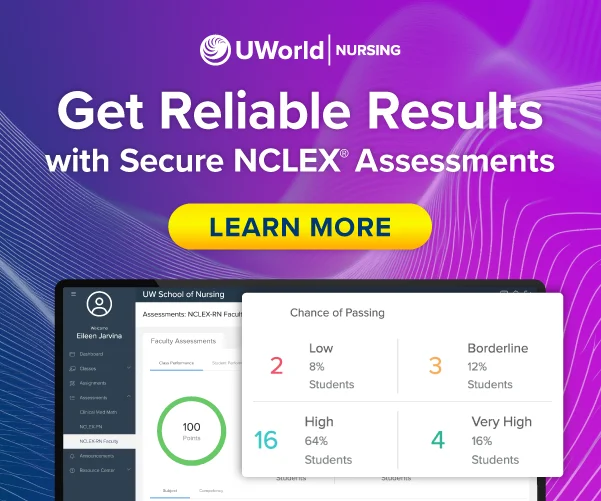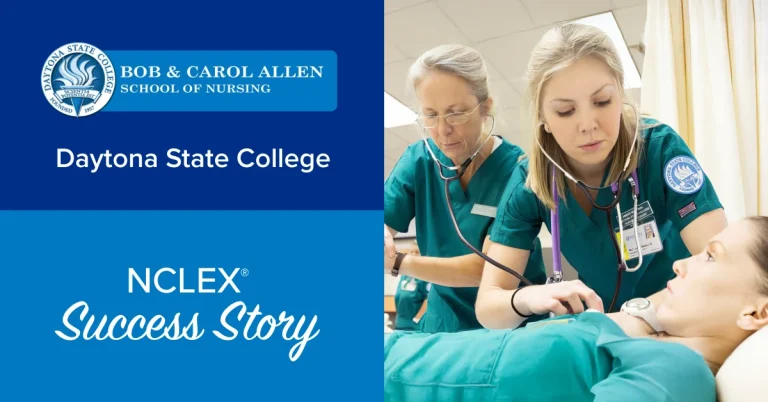So, why are so many students failing? More importantly, what can educators do about it?
The NCLEX Challenge: What the Data Reveals
Recent Trends in NCLEX Pass/Fail Rates
According to the National Council of State Boards of Nursing (NCSBN®), U.S. pass rates have dipped in recent years—especially after the launch of the Next Generation NCLEX (NGN). First-time pass rates among ADN and BSN graduates have dropped below those of prior years1, prompting concern among nursing faculty.
Common Weaknesses Among Repeat Test Takers
Students who fail the NCLEX once are significantly more likely to fail again. Common gaps include poor test-taking strategy, lack of confidence, and a weak grasp of clinical judgment.
The Shift to the Next Gen NCLEX (NGN): What Changed?
The NGN introduced case-based scenarios and new item types that require deeper reasoning. Content memorization isn't enough—students must demonstrate how they think, not just what they know.
Why Students Fail the NCLEX: Educator Insights from the Field
To better understand why students struggle with the NGN, UWorld conducted a Spring 2025 survey of nurse educators across LPN, ADN, BSN, and accelerated programs. Respondents were asked to rank the top predictors of NCLEX failure. Here are the results:
- Low performance in key content areas remains the most cited predictor. When students repeatedly underperform in foundational subjects like pharmacology, med-surg, or prioritization, it often signals deeper comprehension issues that can compound during NCLEX prep.
- Inadequate clinical judgment or decision-making skills are another major concern, especially in the NGN era, when success hinges on students applying knowledge to complex, evolving patient scenarios.
- Poor test-taking skills came in third. Even well-prepared students may struggle to apply what they know under timed conditions. Educators report that students who lack pacing, strategy, or the ability to interpret NCLEX-style questions tend to perform inconsistently on practice and real exams.
- Test anxiety or lack of confidence continues to impact outcomes, with many educators noting that emotional readiness plays just as big a role as content knowledge. Students overwhelmed by the pressure of licensure often disengage or second-guess themselves.
- Low GPA or inconsistent academic performance is also a leading indicator. A pattern of poor grades, withdrawals, or last-minute cramming can point to surface-level learning strategies that fall short during exam-level application.
- Delayed testing—waiting several months after graduation to attempt the NCLEX—was identified as a common contributor to failure. Many students lose momentum and retention during that gap period.
- Limited engagement with NCLEX-style practice is a red flag. Students who avoid or minimize realistic, computer-based question practice tend to perform poorly on adaptive test formats like the NGN.
- External factors such as work, family obligations, or financial stress also ranked high among educators. These stressors can disrupt consistent study habits and lead to fragmented preparation.
- Lack of timely remediation or institutional support rounds out the list. Programs that fail to flag struggling students early or offer individualized remediation risk allowing those students to progress unprepared into high-stakes testing.
These insights reinforce the importance of proactive intervention, data-informed teaching, and integrated NCLEX-style practice throughout the curriculum. Tools like UWorld's performance dashboards and NGN-style questions help faculty spot and support at-risk students before they fall through the cracks.
How Nurse Educators Can Reduce NCLEX Failure Rates
In the same Spring 2025 educator survey, we asked faculty across program types which teaching strategies were most effective for NCLEX success. The results were clear: 89% of respondents said practice questions were essential, and 88% highlighted active learning as a top instructional approach.
These findings confirm what high-performing programs already know—students learn best by doing, not just reviewing. That means exposure to exam-style questions and active engagement with clinical decision-making scenarios should be central to any NCLEX prep strategy.
Incorporate Case-Based Learning and NCLEX Item Types
Prepare students for what they'll actually face. Integrating NCLEX-style questions throughout the curriculum helps normalize clinical judgment thinking and reduces the cognitive gap between classroom learning and licensure testing.
Track Readiness Through Performance Analytics
Tools that provide real-time insight into topic-level mastery help educators intervene before students fall behind or disengage. Analytics can highlight not just what students got wrong—but why—and where trends are emerging across cohorts.
Identify and Intervene with At-Risk Students Early
By monitoring performance over time, educators can flag warning signs early and offer targeted remediation. This proactive approach supports equity and ensures all students have a fair shot at first-time success.
Focus on Conceptual Understanding, Not Just Content Delivery
Active learning isn't just a buzzword—it's a differentiator. Whether through Socratic questioning, simulation labs, or NCLEX-style discussion prompts, programs that challenge students to think like nurses see stronger performance outcomes.
Use Multiple Assessments to Predict and Improve NCLEX Outcomes
Academic research consistently shows that students who perform well on diagnostic exams—and even small improvements in scores—are significantly more likely to pass the NCLEX2. This reinforces the importance of evaluating readiness across the curriculum, not just at the end.
UWorld's multiple NCLEX assessments support this approach. From early diagnostics to comprehensive readiness predictors, each assessment reflects current NCLEX standards and NGN item types—while delivering performance insights that help programs tailor instruction and remediation.
Why UWorld Is the Top Choice for Nursing Programs
UWorld was built for modern NCLEX prep—especially in the NGN era. Here's how it helps educators improve student outcomes.
Assignable NCLEX-Style Questions Aligned to NCSBN Standards
UWorld's comprehensive QBank is regularly updated to mirror the latest NCLEX blueprints, including unfolding case studies, bowtie items, and matrix-multiple response questions.
Detailed Rationales That Reinforce Clinical Reasoning
From traditional multiple-choice to NGN-style items, UWorld's detailed rationales for both correct and incorrect answers develop clinical reasoning and how to apply it in real patient scenarios.
Concise Lecture Videos Reinforce Foundational Knowledge
Target the #1 predictor of NCLEX failure with short, high-impact videos that simplify complex topics and strengthen core nursing knowledge.
Data Dashboards for Educator and Student Insight
Faculty gain real-time visibility into student performance, enabling them to identify weak areas, compare cohort trends, and monitor progress across the program.
Faculty Resources and Integration Support
UWorld partners with programs to support integration, provide onboarding, and offer institutional pricing that supports equity and access.
What Educators Are Saying
Explore real-world stories from our partner institutions and see how our adaptable resources empower educators to create engaging learning experiences and elevate NCLEX pass rates.
“I would highly recommend it,” she said. “UWorld is a tool that works, and with the right faculty support, it can lead to phenomenal outcomes.” Dr. Maria Martinez, University of St. Francis
“So many students have test anxiety. I have seen that when they use UWorld, students become more confident.” Jan Buxkemper, South Plains College
“After using UWorld, we saw improvement in our program learning outcomes, including NCLEX pass rates and program completion rates.” Dean Maxine Hicks, Daytona State University
Final Thoughts: From NCLEX Failures to Future Nurses
NCLEX failure isn't inevitable. With the right tools, strategies, and early interventions, nurse educators can turn setbacks into success stories.
Programs that prioritize clinical judgment, data-driven insights, and realistic exam practice see results where it matters—on licensure boards and hospital floors.
Ready to strengthen your NCLEX outcomes? Explore UWorld's NCLEX Teaching and Learning Platform today.
References
- National Council of State Boards of Nursing, Inc. (2025). NCLEX Pass Rates retrieved from https://www.ncsbn.org/exams/exam-statistics-and-publications/nclex-pass-rates.page
- Flowers, M., Olenick, M., Maltseva, T., Simon, S., Diez-Sampedro, A., & Allen, L. R. (2022). Academic factors predicting NCLEX-RN success. Nursing Education Perspectives, 43(2), 112–114. https://doi.org/10.1097/01.NEP.0000000000000788









